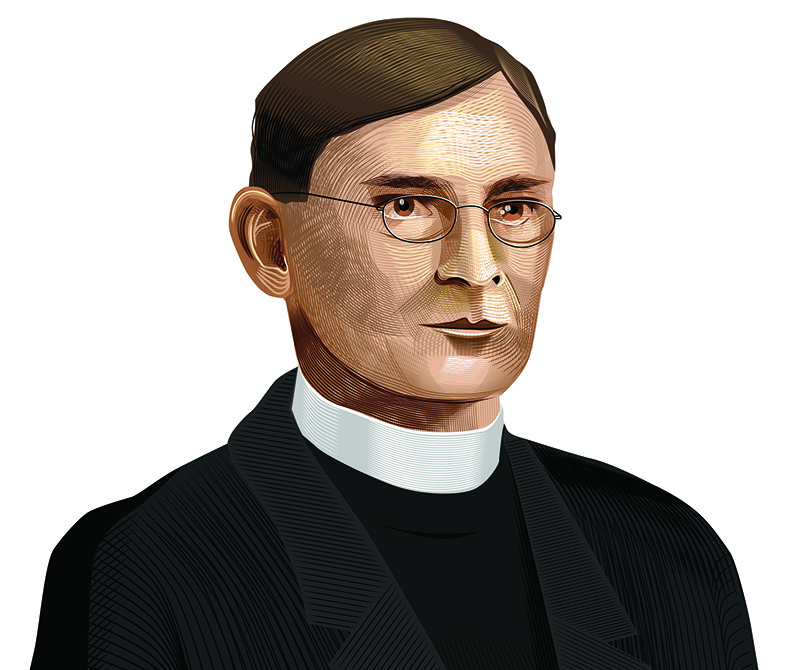His Popularity Portended Life as the ‘Socialist Bishop’
Franklin Spencer Spalding 1887 (1865-1914)
When Frank Spalding entered Princeton in the fall of 1883, the son of an Episcopal bishop from Colorado, he had neither the “prestige of a big preparatory school behind him” nor “the glamour of wealth,” according to John Howard Melish’s 1917 biography, Franklin Spencer Spalding: Man and Bishop. But by the time he graduated in 1887, he was known to his peers as “Old Pop” — short for Old Popularity. His ability to connect with people would serve him well during a long ministry career in which he would come to be known as the “Socialist Bishop,” while his spirit of adventure propelled him to achieve a mountaineering milestone.
Spalding was born in Erie, Pennsylvania, but moved with his family at age 8 to the rough-and-tumble environs of Denver, Colorado, where his father, Rev. John Franklin Spalding, was elected missionary bishop in 1873. He showed promise in school, and thus he and his brother William, 18 months his junior, entered Princeton at the same time. The extremely limited means of a missionary family would have been a financial obstacle were it not for a grandfather who offered to pay the boys’ way.
“No one,” he once wrote, “has seen a mountain until he has been on top of it.”
At Princeton, Spalding excelled across many fields. He was a managing editor at The Daily Princetonian and a member of Whig Hall, where he won the Lynde Prize Debate in his senior year on the question of the repeal of part of the Silver Act of 1878. Perhaps he was influenced to join the Whigs after a run-in with President James McCosh during his freshman year, when he and a friend asked “Old Jimmy” if he was a Whig. McCosh responded, “Yes, indeed I will fight Clio any day.”
Spalding played third base on the class baseball team, captained the “second foot-ball team” as a halfback and fullback, and won medals in athletic pursuits ranging from jumping to pole vaulting to hurdling. He also once hosted a 27-man boxing match in his dorm room. His athletic prowess was on display during one ferocious contest between the sophomore and freshman classes over the cannon. Sophomores would paint the cannon green to mock the “verdancy” of the freshman class, and shortly after its painting one day, the freshmen charged the cannon. Spalding and his classmates moved to defend, and his hold couldn’t be dislodged.
Another “sophomoric” prank would get Spalding briefly suspended: this time, for conspiring with his classmates to interrupt the freshman class photo on the steps of Witherspoon Hall. He was sent to nearby Pennington to rusticate, but an outcry from the freshman and sophomore classes led to his immediate reinstatement. Of the Committee on Discipline’s decision, his Princetonian uncle Will Spencer 1870 wrote: “The cunning dogs were boys once, and I presume chuckle among themselves.”
Spalding went on to enter the ministry and served in Colorado and Pennsylvania before being elected missionary bishop of Utah in 1904. His athleticism and love of the outdoors never left him, though. During the summer of 1898, he led an expedition that was the first confirmed ascent of Grand Teton, the 13,775-foot peak in northwest Wyoming. “No one,” he once wrote, “has seen a mountain until he has been on top of it.”
During his episcopate, Spalding became known as the “Socialist Bishop” for his vocal commitment to socialism as a Christian practice, finding common cause with laborers, miners, and other working-class people on the edges of the Western frontier. He made many visits to mining towns in Utah and Nevada, and even encountered one famous Princetonian on a trip to Goldfield, Nevada, in 1905 — in a letter to his mother, he wrote “Two of the Poes, of Princeton foot-ball fame, are here. Johnnie Poe [1895, namesake of Poe Field] will help me Sunday in the choir and pass the plate.”
Bishop Spalding’s life of devoted ministry would be cut tragically short. In September 1914, having begun to preach peacemaking at the outset of World War I, he stepped into the street outside his home and was killed by a recklessly driven automobile. His funeral attracted thousands of mourners and PAW memorialized him as “one of the most useful sons of Princeton.” His life was one of adventure and service, and everywhere “Old Pop” went he certainly left a big impression.












No responses yet